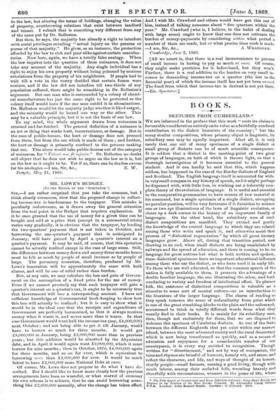MR. LOWE'S BUDGET.
[TO THE EDITOR OF THE "SPECTATOR.:]
SIR,—I am rather surprised that you take the common, but I think clearly erroneous, view that the proposed change in collecting income-tax is burdensome to the taxpayer. This mistake is peculiarly unfortunate, as it draws away the general attention from the real point in the Budget that requires explanation. If it be once granted that the use of money for a given time can be bought and sold at a price that (except in a commercial crisis) varies very gradually, it is obvious that the taxpayer, by lending the two quarters' payment that is not taken in October, and borrowing the one-quarter's payment that is anticipated in January, will have gained by April a quarter's interest on a quarter's payment. It may be said, of course, that this operation cannot be actually realized except in the case of large sums. Still, the difference between money down and money three months hence must be felt as much by people of small incomes as by people of large. The pecuniary sensation, therefore, produced by Mr. Lowe's innovation will be approximately the same with both classes, and will be one of relief rather than burden.
But, at any rate, we may calculate the loss and gain of Government on the assumption of a fixed price for the use of money. Even if we cannot precisely say that each taxpayer will gain a quarter's interest on a quarter's tax, it ought to be accurately true that Government will lose a corresponding amount. I have not sufficient knowledge of Governmental book-keeping to show how this loss will actually be realized ; but it is easy to show what it would be in the ideal case that the receipts and expenditure of Government are perfectly harmonized, so that it always receives money when it wants it, and never more than it wants. In that case Government would want half the income-tax (say, £4,000,000) next October ; and not being able to get it till January, would have to borrow so much for three months. It would get £8,000,000 in January, being £2,000,000 more than in previous years ; but this addition would be absorbed by the Abyssinian debt, and in April it would again want £2,000,000, which it must borrow for nine months ; then in October, 1870, £4,000,000 again for three months, and so on for ever, which is equivalent to borrowing more than £2,000,000 for ever. It would be much better to have £2,000,000 more National Debt at once:
Of course, Mr. Lowe does not propose to do what I have described. But I should like to know more clearly how the previous arrangements have been so wasteful, or what marvel of economy his own scheme is to achieve, that he can avoid borrowing something like £2,000,000 annually, after the change has taken effect.
And I wish Mr. Crawford and others would have got this out of him, instead of talking nonsense about " five quarters within the year." Mr. Crawford (who is, I believe, in the habit of dealing with large sums) ought to know that one does not estimate the burden of money-payments by.considering within what period a number of them are made, but at what precise time each is made.
A WRANGLER..
Cambridge, June 2, 1869.
[All we assert is, that there is a real inconvenience to persona of small income in having to pay so much at once. Of course, they might make provision for it beforehand, but they won't. Further, there is a real addition to the burden on very small incomes in demanding income-tax on a quarter (the last in the financial year) of which the income itself has not yet been earned. The fund from which that income-tax is derived is not yet there. —ED. Spectator.]






























 Previous page
Previous page